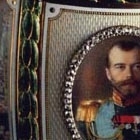Here's a great article with an actual catalog from the Schaffers - before ALVR was opened - offering Faberge and Imperial treasures for sale in New York







CHAPTER 8
A GLIMPSE OF POLAND
WE were very sorry to leave Darmstadt. On our way to Poland we paid a visit to Potsdam, to the German Emperor and Empress. On arriving we found the troops drawn up in a line, and the Emperor himself met us at the station. The band played the Russian National Anthem, and the two Emperors walked along and inspected the regiments. The Emperor of Russia shook hands with the officers and congratulated them. He and the Empress then went off to lunch at the palace, but we stayed in the train till after lunch, when a carriage arrived and took us up to the palace.
The German Emperor is very like his portraits; the Empress is a fine, handsome woman; she was plainly dressed in a green cloth costume. Both of them admired my, little charges, and took particular notice of their costumes, which were new from London for the occasion. They wore thick cream-coloured silk coats trimmed with beaver, and had hats to match, and they did look very dainty and sweet. Underneath they had cream-coloured guipure lace-frocks over pink silk, and pink sashes. We were taken upstairs by the little princess, only daughter of the German Emperor, a very sweet and nicely-mannered child. The nurseries were all sea green and silver, very attractive rooms. Here we had tea with the little prince and princess. There was no servant in the room, and the little prince himself handed round bread and butter to everyone. Tea over, they took little cousin Olga for a drive in their pony-cart, and the English nurse sent for a carriage and took the other two children and me for a drive through the famous Sans Souci grounds. We then returned to the train and got our little charges to bed. About ten o'clock the Emperor and Empress came; the train, which had been put into a siding to wait, was brought into the station; the band played, and off we started for Poland.
In Poland we stayed in a small palace called Skernivitsi. It is situated in what I should suppose to be the dirtiest little Jewish town in the world. Almost all the inhabitants are Jews, handsome, melancholy looking men; the children and young girls are lovely, while the older women are fat, coarse, untidy looking creatures. It seemed to me they wore wigs made of horse-hair, so coarse and unnatural did their hair appear. The country round was very fiat and ugly, not even a hedgerow to be seen, only here and there a few trees. The Poles are for the most part Roman Catholics; at every cross road is a little shrine or altar, fenced in with iron bars. Here and there on a tree hangs a holy picture, very often much defaced with rain and weather. Going along the roads every now and again one came to a tall black cross, with a tiny figure, perhaps five or six inches long, of the Saviour of mankind hanging on it. So far as I could judge on my three visits to the country, the Poles are the most dishonest, the most untruthful, and the dirtiest people on the face of the earth. Their thefts were very extraordinary; they even pilfered the Imperial luggage when it was standing in the station.
Skernivitsi has a rather romantic history. The Emperor Paul had three sons -- Alexander I., Constantine, and Nicholas I. Constantine was Viceroy of Poland; he fell in love with a Polish countess, who was, from all accounts, both beautiful and amiable, and who lived with her uncle, the Archbishop of Poland, at Skernivitsi. In order to marry her Constantine renounced his claim to the throne, though he was heir apparent, as his brother, Alexander I., though married, had no children.
On the death of her uncle it was found that he had left his niece, Skernivitsi, with its large estates and vast woods. Constantine had no children, and on his death he left the place to his brother Nicholas I. Constantine was popular with the Poles, partly, perhaps, on account of his Polish wife. Russian people will tell you that both Alexander I. and Constantine were childless as a direct punishment from God for the murder of their father. A life use of Skernivitsi was granted by Alexander II. to Prince Baratenski in recognition of some service. On his death, a short time before we went there, the place returned to the Imperial family. The house was in bad repair, and the park a damp, gloomy place, with low-lying ponds in it; the woods teemed with game. There were lovely little black deer, with branching antlers, roebucks and fallow deer; also quantities of pheasants and partridges, to say nothing of foxes. Five or six thousand head of game was a common enough bag after one day's shooting! Foxes are shot in Russia! They do not trouble to shoot rabbits, nor do they eat them, and the people look disgusted if you say they are nice. When the game was brought home it was arranged on the lawn, sometimes with the interlaced monograms of the Emperor and Empress, sometimes with the double-headed eagle of Russia, or something distinctly Polish would be chosen. Torches were then lit and the foresters played their band. The house party then came out to view the game and talk over the incidents of the day's sport. It was a very quaint and pretty sight.
We stayed there a few days and then returned to Tsarskoe Selo, back to the ice and snow, where we remained until the new year.


